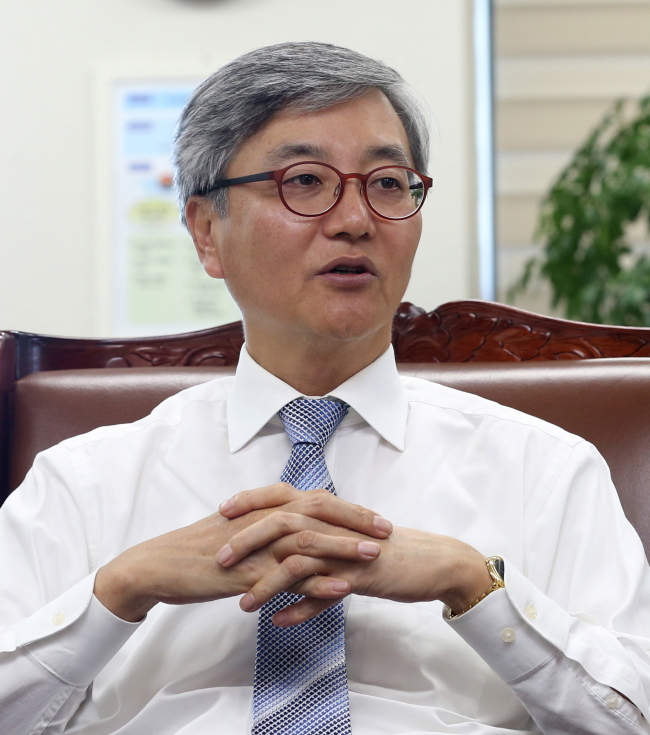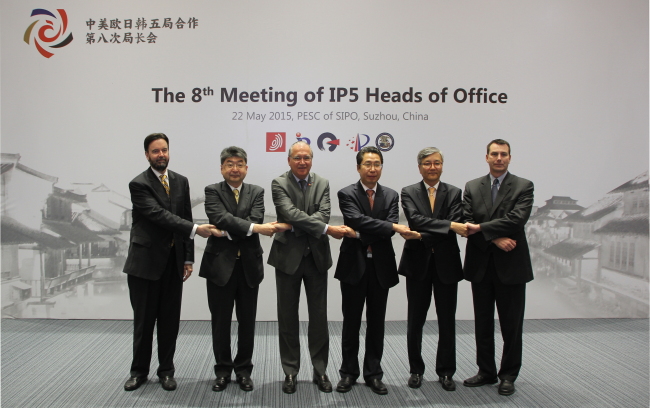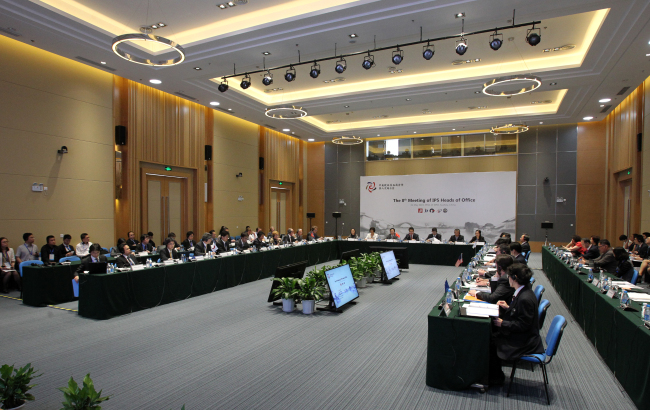Five major world economies ― the U.S., China, Japan, the European Union and Korea ― have adopted a joint statement to provide better intellectual property services to users and the public.
The agreement was reached during the eighth meeting of the heads of “IP5 Offices” in Suzhou, China, late last month.

KIPO CommissionerChoi Dong-gyou
IP5, which began in 2007, is a forum of the five largest intellectual property offices in the world cooperating in order to improve the efficiency of examination processes for patents worldwide. The IP5 collectively handles over 80 percent of the world’s patent applications.
“This joint statement will be a milestone in the history of cooperation in intellectual property in that shines a guiding light on their future course of action,” Commissioner Choi Dong-gyou of the Korean Intellectual Property Office told The Korea Herald after the meeting.
The Joint Statement of the IP5 Offices listed the organization’s achievements since its establishment, and outlines areas of future activity.
“The IP5 Offices will strive to further optimize their services to users and the public, so as to enhance the role of intellectual property in stimulating innovation and promoting socio-economic development,” the joint statement read.

Key participants including KIPO Commissioner Choi Dong-gyou (second from right) pose during the eighth meeting of the heads of IP5 Offices in Suzhou, China, late last month. (KIPO)
The joint statement read that IP5 offices have delivered a series of benefits to the user and public among which include the Common Application Format, which allowed applicants to file for patents in a standardized manner across all IP5 offices, and mutual machine translation, which provides mutual translation between English, Chinese, Japanese and Korean.
In addition to creating a joint statement, the IP5 heads agreed to work together to continue progress to establish the global dossier system, an online system that would allow users to monitor their patent application’s status in IP5 countries, according to Choi.
He said there was “meaningful progress” in discussions about “patent harmonization,” adding that the participants detailed the direction of their cooperation in IT systems for patent deliberation.
The commissioner also said that the KIPO would begin working with the U.S. Patent and Trademark Office on the Collaborative Search Program, a work-sharing program that the Korean agency is suggesting to the IP5 as a method to improve efficiency in patent applications.
The KIPO plans to expand running the program with the other IP offices after its trial run with USPTO, he added.
The IP5 heads also shared views in how to raise the quality of patent examinations and bolster communication with the users. They proposed an OECD-style cooperation method, where IP5 carry out jointly agreed projects and individual IP offices carry out independent projects that did not reach a consensus.

The eighth meeting of IP5 heads in Suzhou, China, late last month (KIPO)
The KIPO chief also supported the achievements of IP5, saying that the IP5 has now surpassed its original goal of organizing and solving their backlog of unexamined patent applications, and is further evolving as an organization that strives for a more convenient and efficient global patent application system.
“The cooperation of the IP5 appears to be (progressing) much faster when looking at the discussions made on intellectual property in the World Intellectual Property Organization and World Trade Organization,” the KIPO head said.
“The IP5 cooperation will hold much larger significance in the future, considering that its achievements affect the world intellectual property application system at large,” he said.
By Sang Youn-joo and Lee Kwon-hyoung (sangyj@heraldcorp.com) (kwonhl@heraldcorp.com)
Following is the full text of the Joint Statement of the IP5 Offices adopted at their meeting in Suzhou, China on May 22. ― Ed.
At the 8th IP5 Heads meeting held in Suzhou, China, on May 22 2015, the heads of IP5 Offices discussed the next steps of IP5 cooperation, and reaffirmed the mission of providing better services for users and the public.
Common recognition
Having recognized that:
- Intellectual property is of vital importance to technological innovation and economic development in the context of economic globalization
- The IP5 Offices seek to continue to provide quality services to users and the public as a whole, so that innovation can flourish with the help of intellectual property rights
- The outcomes of IP5 cooperation have benefited IP5 users and the public, while the current user involvement in the IP5 cooperation has been very beneficial
- Strengthened IP5 cooperation is a significant way of providing users and the public better services
The heads of the IP5 Offices have reached the following joint recognition:
The IP5 Offices will strive to further optimize their services to users and the public, so as to enhance the role of intellectual property in innovation and promoting socio- economic development.
Benefits delivered
Since the beginning of IP5 cooperation in 2007, especially after the involvement of IP5 users in 2012, the IP5 Offices have delivered a series of benefits to users and the public, which mainly include:
- Common Application Format, which allows applicants to file patent applications in a standardized form acceptable at all IP5 Offices.
- Mutual machine translation, which helps users to eliminate language barriers in understanding patent information by providing mutual translation between English and, among others, Chinese, Japanese and Korean.
- Common Citation Documentation, which provides the public with single- point access to up- to- date citation data relating to the patent applications of the IP5 Offices.
- IP5 Patent Prosecution Highway, which enables an applicant to request expedited examination at the IP5 Offices for an application when it has been determined to be patentable at any one of the IP5 Offices.
- Patent information policy, which makes available patent information exchanged among the IP5 Offices to the public or third parties either free of charge or at a marginal cost.
- Priority Document Exchange, which eliminates the burden of applicants in terms of providing priority document to the offices of second filing.
- One Portal Dossier, the backbone for exchanging data for the Global Dossier, allowing the users to conduct safe and one- stop access to IP5 file wrapper data of an application and its IP5 patent family.
- Improvements to existing classification systems, increasing accessibility to prior art and patent information by examiners, applicants and other stakeholders.
- IP5 website (www.fiveoffices.org), providing general information of IP5 cooperation and its progress.
Target areas at current stage
To further improve services, the IP5 heads share the view that at the current stage the IP5 Offices should focus efforts on the following areas:
- Improving patent information services in a network environment
Work together to make progress on the Global Dossier base on user needs, and to promote barrier- free access and in- depth utilization of patent information for users and the public.
- Making further progress on the Patent Harmonization Experts Panel topics
Continue to study and cooperate on the PHEP topics of unity of invention, citation of prior art and written description and sufficiency of disclosure, thereby increasing efficiencies in the patent application procedure and reducing costs.
- Improving user- friendliness of IP5 PPH
Further optimize the IP5 PPH by taking appropriate measures such as implementing the common PPH request form, so as to provide the users with an efficient and easy- to- use PPH program.
- Enhancing applicant assistance
Utilize available resources of each IP5 office to provide assistance to different user groups including SMEs, universities and individuals, so as to promote an effective use of the IP system.
- Increase transparency of the IP5 cooperation
Improve accessibility of IP5 information via IP5 website and continued provision of statistical data, allowing users to have a more comprehensive and clearer recognition of the progress that the IP5 Offices have made.
Future IP5 activities
The heads of the IP5 Offices wish to take full advantage of the resources available at each Office to jointly attain substantive outcomes that are beneficial for users and the public.
The IP5 Offices intend to:
- Strengthen work sharing among the Offices.
Continue to develop the infrastructure and tools required to improve work sharing, and facilitate the attainment of outcomes from work- sharing initiatives to promote efficiency.
- Collaborate to improve the quality in the patent examination procedure.
Continue to hold IP5 quality management meetings, and enhance cooperation relating to practices on classification, search, examination, etc. to improve the quality of patent examinations and ultimately the stability of patent rights.
- Strengthen IP5 cooperation in the PCT.
Strengthen communication and cooperation among the IP5 Offices in the PCT system, with a focus on enhancing the quality of search and examination of the PCT applications, and thereby increasing legal certainty for both users and the public.
- Enhance experience sharing among the IP5 Offices.
Improve the sharing of experiences among the IP5 Offices with regard to user services, including applicant assistance and awareness building efforts, and promote services and best practices as appropriate to the users. 






![[Weekender] How DDP emerged as an icon of Seoul](http://res.heraldm.com/phpwas/restmb_idxmake.php?idx=645&simg=/content/image/2024/04/25/20240425050915_0.jpg&u=)
